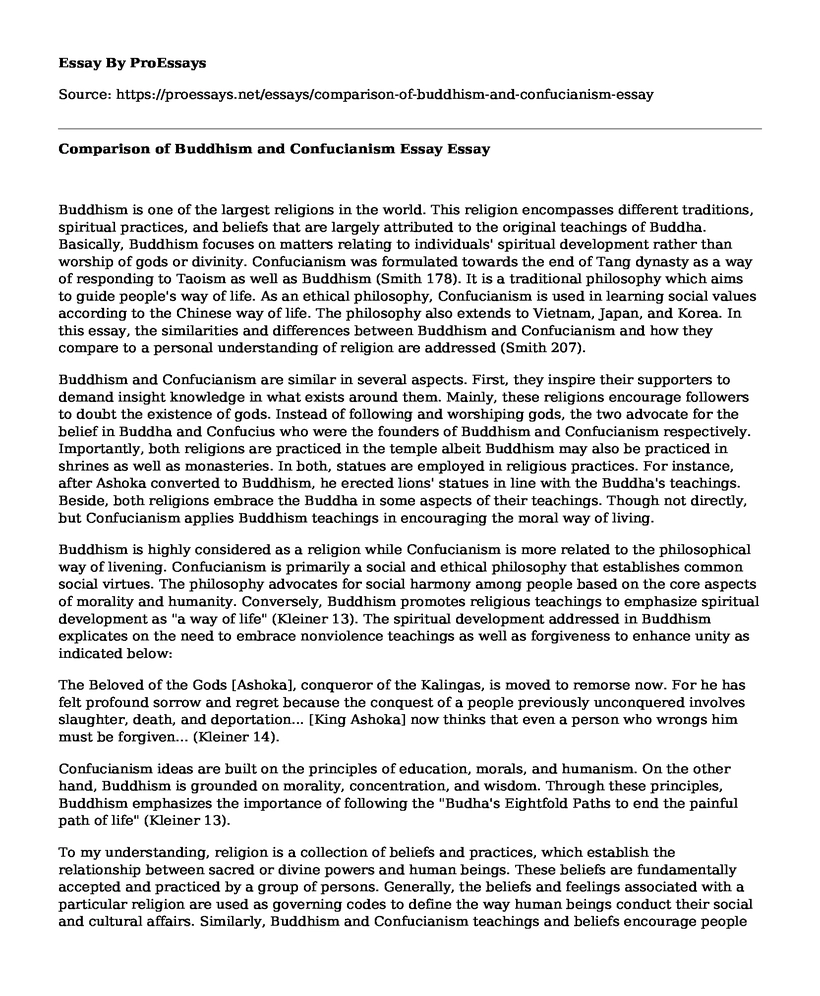Buddhism is one of the largest religions in the world. This religion encompasses different traditions, spiritual practices, and beliefs that are largely attributed to the original teachings of Buddha. Basically, Buddhism focuses on matters relating to individuals' spiritual development rather than worship of gods or divinity. Confucianism was formulated towards the end of Tang dynasty as a way of responding to Taoism as well as Buddhism (Smith 178). It is a traditional philosophy which aims to guide people's way of life. As an ethical philosophy, Confucianism is used in learning social values according to the Chinese way of life. The philosophy also extends to Vietnam, Japan, and Korea. In this essay, the similarities and differences between Buddhism and Confucianism and how they compare to a personal understanding of religion are addressed (Smith 207).
Buddhism and Confucianism are similar in several aspects. First, they inspire their supporters to demand insight knowledge in what exists around them. Mainly, these religions encourage followers to doubt the existence of gods. Instead of following and worshiping gods, the two advocate for the belief in Buddha and Confucius who were the founders of Buddhism and Confucianism respectively. Importantly, both religions are practiced in the temple albeit Buddhism may also be practiced in shrines as well as monasteries. In both, statues are employed in religious practices. For instance, after Ashoka converted to Buddhism, he erected lions' statues in line with the Buddha's teachings. Beside, both religions embrace the Buddha in some aspects of their teachings. Though not directly, but Confucianism applies Buddhism teachings in encouraging the moral way of living.
Buddhism is highly considered as a religion while Confucianism is more related to the philosophical way of livening. Confucianism is primarily a social and ethical philosophy that establishes common social virtues. The philosophy advocates for social harmony among people based on the core aspects of morality and humanity. Conversely, Buddhism promotes religious teachings to emphasize spiritual development as "a way of life" (Kleiner 13). The spiritual development addressed in Buddhism explicates on the need to embrace nonviolence teachings as well as forgiveness to enhance unity as indicated below:
The Beloved of the Gods [Ashoka], conqueror of the Kalingas, is moved to remorse now. For he has felt profound sorrow and regret because the conquest of a people previously unconquered involves slaughter, death, and deportation... [King Ashoka] now thinks that even a person who wrongs him must be forgiven... (Kleiner 14).
Confucianism ideas are built on the principles of education, morals, and humanism. On the other hand, Buddhism is grounded on morality, concentration, and wisdom. Through these principles, Buddhism emphasizes the importance of following the "Budha's Eightfold Paths to end the painful path of life" (Kleiner 13).
To my understanding, religion is a collection of beliefs and practices, which establish the relationship between sacred or divine powers and human beings. These beliefs are fundamentally accepted and practiced by a group of persons. Generally, the beliefs and feelings associated with a particular religion are used as governing codes to define the way human beings conduct their social and cultural affairs. Similarly, Buddhism and Confucianism teachings and beliefs encourage people to carefully analyze the situation before making the right judgments. In addition, they stress the importance of living based on the ethical and moral values that encourage harmonious interactions. The two religions compare to my understanding of religion which mainly concerns morality in social interactions.
Works Cited
Kleiner, Fred S. Gardner's Art Through the Ages: Non-Western Perspectives. Cengage Learning, 2009.
Smith, Huston. The World's Religions. Ishi Press International, 2017.
Cite this page
Comparison of Buddhism and Confucianism Essay. (2022, Feb 18). Retrieved from https://proessays.net/essays/comparison-of-buddhism-and-confucianism-essay
If you are the original author of this essay and no longer wish to have it published on the ProEssays website, please click below to request its removal:
- The Role and Portrayal of Women in the Old Testament Essay
- Psalms 137 Research Report
- Paper Example on Christian Worldview
- Essay Example on My Son Blazes Within Me: Exploring Family, Spirituality & More
- Research Paper on God's Charismatic Gift: Jesus Christ and the Christian Moral
- Be a Christian: All Religions Contain Some Truth - Essay Sample
- Christianity and Abortion: A Complicated History - Essay Sample







